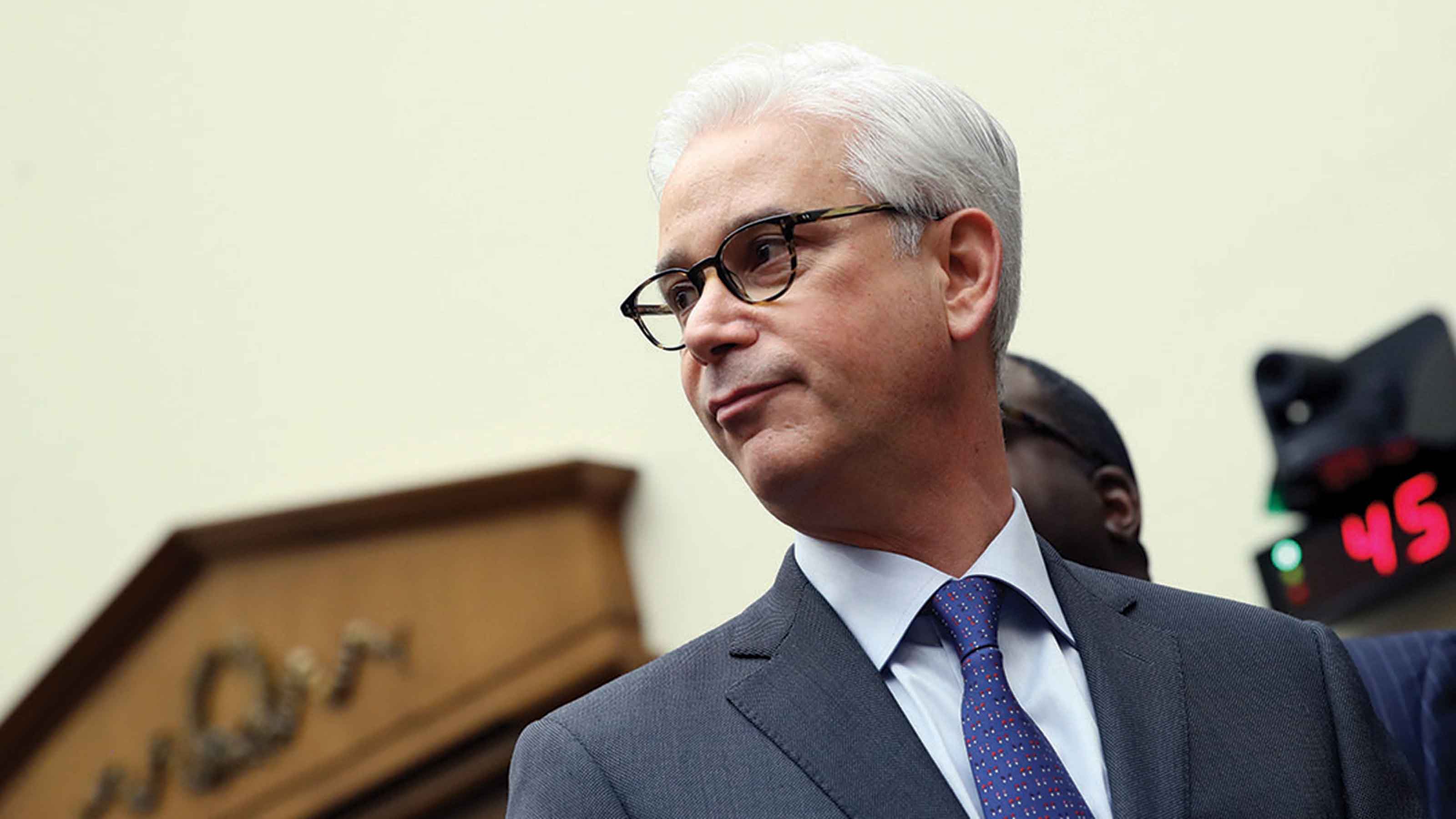My Take on Financial Reform
The new rules for our financial system are a mixed bag for individual investors.

Profit and prosper with the best of Kiplinger's advice on investing, taxes, retirement, personal finance and much more. Delivered daily. Enter your email in the box and click Sign Me Up.
You are now subscribed
Your newsletter sign-up was successful
Want to add more newsletters?

Delivered daily
Kiplinger Today
Profit and prosper with the best of Kiplinger's advice on investing, taxes, retirement, personal finance and much more delivered daily. Smart money moves start here.

Sent five days a week
Kiplinger A Step Ahead
Get practical help to make better financial decisions in your everyday life, from spending to savings on top deals.

Delivered daily
Kiplinger Closing Bell
Get today's biggest financial and investing headlines delivered to your inbox every day the U.S. stock market is open.

Sent twice a week
Kiplinger Adviser Intel
Financial pros across the country share best practices and fresh tactics to preserve and grow your wealth.

Delivered weekly
Kiplinger Tax Tips
Trim your federal and state tax bills with practical tax-planning and tax-cutting strategies.

Sent twice a week
Kiplinger Retirement Tips
Your twice-a-week guide to planning and enjoying a financially secure and richly rewarding retirement

Sent bimonthly.
Kiplinger Adviser Angle
Insights for advisers, wealth managers and other financial professionals.

Sent twice a week
Kiplinger Investing Weekly
Your twice-a-week roundup of promising stocks, funds, companies and industries you should consider, ones you should avoid, and why.

Sent weekly for six weeks
Kiplinger Invest for Retirement
Your step-by-step six-part series on how to invest for retirement, from devising a successful strategy to exactly which investments to choose.
The Dodd-Frank financial-reform law is designed to stabilize the economy and the financial system. But it's likely to impact individual investors for decades in ways both good and bad.
I approve of the rules that limit and tighten capital ratios for all major financial firms (not just banks), and require the firms to draw up "living wills" that clearly establish the order of claims if they fail. Furthermore, I like the idea of bringing most of the $600-trillion derivatives industry out into the open, where contracts can be traded, priced and monitored by all parties. The lack of clear pricing, for example, allowed American International Group to get by for far too long because regulators didn't recognize how much the insurer was underwater on its credit-default swaps.
The law also establishes a Financial Stability Oversight Council headed by the Treasury secretary. Financial stability should be the Federal Reserve's responsibility, but both Alan Greenspan and the Fed were asleep at the switch while the housing bubble was inflating. They did not think that the housing market qualified as a bubble or that the buildup of poor-quality credit in the banking system was cause for concern.
From just $107.88 $24.99 for Kiplinger Personal Finance
Become a smarter, better informed investor. Subscribe from just $107.88 $24.99, plus get up to 4 Special Issues

Sign up for Kiplinger’s Free Newsletters
Profit and prosper with the best of expert advice on investing, taxes, retirement, personal finance and more - straight to your e-mail.
Profit and prosper with the best of expert advice - straight to your e-mail.
The council's task of warning about financial excesses will not be easy. There's a danger that the council could squelch a booming sector of the economy that isn't a bubble at all but instead heralds a breakthrough in technology. Nevertheless, given the Fed's failure to warn of dangers in the last cycle, a second opinion may be useful. Some economists are dismayed that the new law doesn't address the critical issue of "too big to fail." But here I think the law is right. Like it or not, most large international borrowers and lenders are attracted to big-name financial firms. Arbitrary limits on the size of companies would greatly hinder the ability of the U.S. banking industry to establish strong and dominant positions in global markets.
A Mixed Bag
Of lesser importance to financial stability is the creation of the much-ballyhooed Consumer Financial Protection Bureau. Consumer protection was really not an issue in the last crisis and, to be truthful, existing agencies had the power to issue most of the regulations assigned to this new bureau.
Increased regulation of the credit-rating agencies is another mixed blessing. There's no question that Standard & Poor's, Moody's and other rating agencies failed big-time to rate housing-related securities properly, and their overly optimistic ratings clearly contributed to the financial crisis. It's also true that the government had given these firms special status to be arbiters of the quality of debt instruments.
So I welcome the new rules that will strip away the privileges of the agencies and give individuals power to sue the rating firms. But the government could easily go overboard and make it too risky for those firms to assess the quality of assets because of potential litigation.
In a similar vein, the bill gives regulators the power to deem which investments are "appropriate" for individual investors. That could open the door to massive litigation by investors who suffer losses.
Another provision that I'm concerned about is "say on pay" regulations that require extensive shareholder input on executive compensation. Conflicts of interest between management and shareholders have been a fact of corporate existence for centuries. This issue is best resolved not by government regulators but by investors denying fat paychecks to profligate managers.
The vast majority of regulations required by the law are yet to be written. If they become burdensome, they will make our financial sector less competitive. If not, they can contribute to growth and stability. The devil of this law is not only in the details, but also in the regulators who enforce them.
Columnist Jeremy J. Siegel is a professor at the University of Pennsylvania's Wharton School and the author of Stocks for the Long Run and The Future for Investors.
Profit and prosper with the best of Kiplinger's advice on investing, taxes, retirement, personal finance and much more. Delivered daily. Enter your email in the box and click Sign Me Up.

-
 How Much It Costs to Host a Super Bowl Party in 2026
How Much It Costs to Host a Super Bowl Party in 2026Hosting a Super Bowl party in 2026 could cost you. Here's a breakdown of food, drink and entertainment costs — plus ways to save.
-
 3 Reasons to Use a 5-Year CD As You Approach Retirement
3 Reasons to Use a 5-Year CD As You Approach RetirementA five-year CD can help you reach other milestones as you approach retirement.
-
 Your Adult Kids Are Doing Fine. Is It Time To Spend Some of Their Inheritance?
Your Adult Kids Are Doing Fine. Is It Time To Spend Some of Their Inheritance?If your kids are successful, do they need an inheritance? Ask yourself these four questions before passing down another dollar.
-
 Airbnb Host Tells What It's Like
Airbnb Host Tells What It's LikeBusiness Costs & Regulation This Denver pharmacist began booking her ski condo a few months after the pandemic hit.
-
 Tough Times for a Family Business
Tough Times for a Family BusinessBusiness Costs & Regulation His dry-cleaning operation was rocked by the pandemic, but he is staying optimistic.
-
 IRS Gives Truckers a Tax Break in Response to the Colonial Pipeline Shutdown
IRS Gives Truckers a Tax Break in Response to the Colonial Pipeline ShutdownTax Breaks The tax penalty for using dyed diesel fuel for highway use is temporarily suspended.
-
 Reliving a Harlem Renaissance
Reliving a Harlem RenaissanceBusiness Costs & Regulation After a tough winter, two sisters look forward to reviving their restaurant’s business.
-
 Add a VPN to Surf the Internet Safely
Add a VPN to Surf the Internet SafelyTechnology To help you fight identity theft, consider adding a VPN.
-
 Stephanie Creary: Making the Case for Diversity on Corporate Boards
Stephanie Creary: Making the Case for Diversity on Corporate BoardsBusiness Costs & Regulation Adding underrepresented voices can improve a company’s bottom line.
-
 How We Lose When We Overlook Black Talent
How We Lose When We Overlook Black TalentBusiness Executives Comments from Wells Fargo CEO Charles Scharf (pictured) reflect a culture that tramples on clients’ trust and limits opportunities for people of color.
-
 Retirees, Create An Emergency Fund for Rental Property
Retirees, Create An Emergency Fund for Rental PropertyBusiness Costs & Regulation Build a cushion to protect your income from an unforeseen crisis.